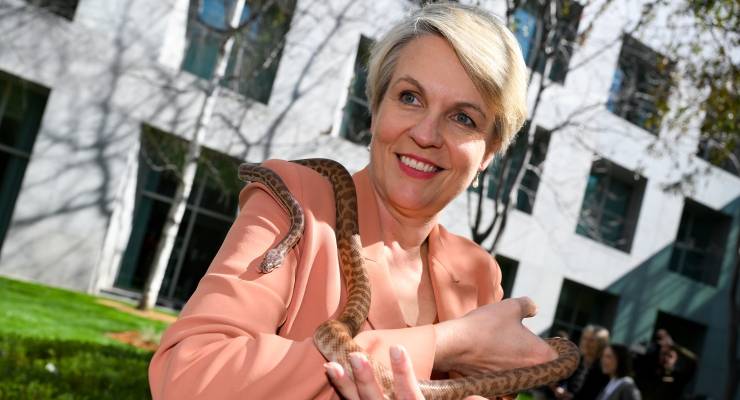
More than three years ago, former competition watchdog Professor Graeme Samuel handed down his review of Australia’s environment laws, the Environment Protection and Biodiversity Conservation Act 1999 (EPBC).
His verdict? A concerted effort was needed to “fundamentally re-write and modernise the act and its implementation”. To fail on these reforms would be to accept the “continued decline of Australia’s iconic places and the extinction of threatened plants and animals”.
In short, the laws worked for no-one — least of all the environment — and needed a complete overhaul.
Fast forward to a nondescript meeting room in Canberra earlier this year, where dozens of representatives from key groups such as environment NGOs, the Minerals Council of Australia and the Business Council found themselves sitting around tables at a budget-style “lockup”.
Phones and other devices were locked away, and participants were issued a pad of paper and instructed not to share anything publicly.
“It was like being back in a Year 12 exam,” said one participant. “All my notes were hand scribbled on bits of paper. It’s a super frustrating process.”
This meeting was one of three closed-door sessions (a fourth is planned for late April), where participants were shown sections of new draft environment legislation and related policy documents, though not always in their entirety or always at the same time. This has made it difficult to piece all of the law reforms together.
“You’re continually on this treadmill of policy engagement which feels like a strategic move to keep people busy,” said another participant of the highly unusual process. “It’s really frustrating.”
While Scott Morrison’s Coalition government never formally responded to the Samuel review, Environment Minister Tanya Plibersek launched the federal Labor government’s proposal — dubbed the “Nature Positive” plan — in late 2022, and said law reforms would be introduced by December 2023. They weren’t, and now the legislation will be delayed until at least the middle of this year.
Biodiversity Council director James Trezise is concerned at the slow pace of the reforms and wants the complete package out in the public realm for scrutiny.
“It’s a cop-out to say this government hasn’t had enough time. They have been in power for almost two years,” Mr Trezise said. “This isn’t just a problem for Minister Plibersek, it’s going to be one for the Albanese government — this is the key measure on which their environmental performance is measured.” Environmental groups are pleased with plans to introduce an Environmental Protection Agency and a set of national environmental standards. But they say the reworked laws still allow too much discretion for decision-makers, including ministerial “call in” powers.
There is no reference to climate change in the 1,000-plus pages of the existing EPBC Act, which was drafted in 1999. Environment groups want climate to be explicitly mentioned in the objectives of the new laws and embedded throughout the legislation. So far, the government has agreed to include a requirement to consider the emissions profile of projects, but this will not include the so-called “scope 3” emissions, often produced when a company’s customers buy their product (for example, the emissions from Australian coal burned overseas).
The climate elements of the legislation will likely be determined or amended by interested members of the Parliament as the bills go through, such as independent Andrew Wilkie, the teal crossbenchers, the Greens and senators like David Pocock. These MPs are waiting to see details of the final bills before making demands but have privately expressed concern about the delays.
Senator David Pocock told Crikey the reforms must be comprehensive: “Ad-hoc changes and tinkering at the edges is not going to cut it.”
He wants to see changes that will mean Australia can deliver the government’s commitment to no new extinctions. “This means strong national environmental standards that protect critical habitat and an adherence to recommendations of the Samuel Review,” he said. “It also means increasing funding for threatened species, which is currently woefully inadequate.”
Legal expert Rachel Walmsley, from the Environmental Defenders Office, said she was “cautiously hopeful” critical details would be addressed at the April lockup.
“We want the details of the new laws to meet the ambition set out in the Nature Positive plan, and we are concerned the drafts we are seeing will repeat the inadequacies of the current law,” Walmsley said.
Australia’s extinction rate is one of the worst in the world. About 100 of Australia’s flora and fauna species have been wiped out since colonisation, and there are now 1,900 threatened species at greater risk of extinction.
A spokesperson for Pliberserk said the government would fix the laws so they better protect the environment and give faster, clearer decisions to businesses. Experts from almost 100 groups have examined draft parts of the legislation and there have also been public consultation sessions attended by more than 2,000 people, they said.
Brendan Sydes, a biodiversity expert at the Australian Conservation Foundation, said the law reform is a large, complex exercise but progress is slowly being made. He urged the government not to miss this critical opportunity.
“We need a clear commitment to getting this to Parliament and for strong upfront protection, and to deal with climate change.”








I can’t muster up any positivity with this secrecy. Sure you can be optimistic and they may want to avoid the usual smear/fear campaigns from vested interests, but by judging by their current trackrecord, it’ll be woefully inadequate and pandering exactly to those vested interests and just ram it through the house with a ‘we consulted with everyone, they agreed with everything (of what we showed them)’.
Don’t disagree but see my possibly over-optimistic reply to Frank Dee
As we cruise past 1.5°C, accelerating towards 2°C and the unknown hazards of likely 5°C the Government is incestually entwined with fossil fuel companies which are only COMPANIES, not people, and are not equipped with a conscience and have absolutely no regard for my childrens’ wellbeing, health or happiness, or indeed even that of their own children or our so-called politicians’ children, or the zillions of other forms of life we SHARE the Earth with. In fact it is safe to say that never before in human (or any other) history has there ever been such a stupid, lying, ignorant bunch of death-dealing wankers, and you know who I mean, on the planet. In their hands is the one and only chance to stop the rot, ditch the pricks with so-called vested interests, and begin to spend OUR MONEY on OUR INTERESTS.
Thanks, Miki.
This is very laudable, and absolutely necessary, which is why it was on the backburner for so long and will remain so. In politics, no one wants to deal with good intentions. The fact that the Business Council and the fossil fuel reps are a major part of the process – while seemingly an even-handed decision – may also indicate that a lot of wriggle room is intended for new legislation, wriggle room that’s possibly about the size of the Queensland Olympic stadium.
Yes consulting with mining interests and the Business council is very fraught. Their interests (as articulated by the peak lobbies) are in the use and abuse of nature and they can be presumed to always be acting in bad faith. However, keeping them muzzled by secrecy may be a good tactic if the government is acting in good faith vis a vis the environment. Having ethical expert advocacy groups in the room, to bear witness to and robustly rebut business claims and distractions, may also be useful and usefully done candidly behind closed doors. That is the most positive spin I can put on it. At some point the decisions and maybe some of the thinking behind them will have to be public. Then the gloves come off and the usual media suspects (and the opposition) will pour in behind industry. We will also get a measure from the proposals of how dinkum the government is.
Nooo, it’s a genuine ‘security’ issue, for subsidiaries of offshore fossil fuel and mining cos. and shareholders, future income streams and present value.
When the EPBC Act was being drafted in the late 1990s, it was going to be the ant’s pants for environmental protection, replacing a slew of old laws such as the World Heritage Properties Act 1983. Then it came out, the size of a phone book (remember them?), full of bureaucratic complexity and convoluted thinking as it tried to meet the demands of both conservationists and developers. Now, much the same arguments about the ‘need’ for modernity etc – I’m thinking in even less time we will have gone around the circle even faster and be back to needing to ‘modernise’ the legislation, but only through a secretive drafting process. What’s the point? Sorry to be so cynical.
Imagine ‘Sus’ Ley presiding over this process, still? …. With a coal fired back-burner.